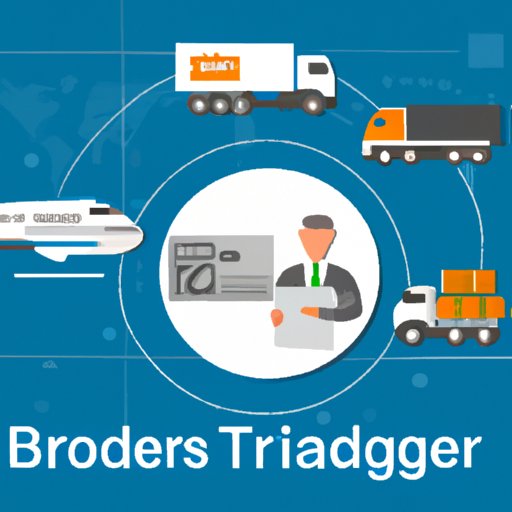Introduction
The transportation industry is responsible for moving goods across the country and around the world. One essential player in this industry is the freight broker, who acts as a middleman between shippers and carriers, coordinating the movement of goods from one destination to another. Starting a career as a freight broker can be a lucrative and rewarding opportunity for those who are interested in logistics and transportation. This article aims to provide aspiring freight brokers with a step-by-step guide to becoming a freight broker, insights from successful brokers, and market opportunities available in this growing field.
Step-by-Step Guide
Becoming a freight broker involves a series of steps, and it can be challenging to know where to start. Here’s a simplified guide to help you jump-start your journey to becoming a freight broker:
Researching the Industry and Market Opportunities
One of the essential steps of becoming a freight broker is researching the transportation industry and identifying market opportunities. Doing so helps you understand the industry’s needs and your ability to meet those needs. Conduct a thorough investigation, including studying industry trends, identifying potential customers, and researching your competition.
Getting the Required Education and Experience
To become a freight broker, you need to have a blend of education and experience. This includes learning the regulatory requirements, transportation laws, and specific industry practices. There are several ways to get education and experience, including on-the-job training or attending training schools with freight broker courses.
Applying for a Freight Broker License and Surety Bond
Once you have had the relevant training and experience, you can apply for a freight broker license through the Federal Motor Carrier Safety Administration (FMCSA). Applicants must also secure a surety bond covering at least $75,000 to obtain a freight broker license.
Setting up a Business Entity and Obtaining Necessary Permits
After getting your freight broker license, set up your business entity and obtain all the necessary permits and insurance. The exact requirements may vary depending on your state’s laws and business structure, so be sure to research these requirements in your area.
Building Relationships with Shippers and Carriers
One significant component of being a successful freight broker is building strong relationships with shippers and carriers. Reach out to potential clients and make connections with carriers that you can rely on to move the shipments you broker.
Interviews with Successful Brokers
One of the best ways to learn from the experts in any field is by engaging and interviewing established professionals. Here are some of the questions aspiring freight brokers should ask established brokers:
How did you get started in the freight brokerage industry?
What challenges did you face, and how did you overcome them?
What advice would you give to someone looking to start their brokerage?
Exploring the Market Opportunities
Freight brokerage is a growing industry, and it offers plenty of market opportunities. According to the American Trucking Association, nearly 71% of all freight tonnage moved in the United States goes on trucks, equivalent to over 10.5 billion tons of freight annually. Freight brokerage is responsible for matching carriers with shippers to move such goods.
The job outlook for freight brokers looks promising because of this growing demand. This, combined with the industry’s high earning potential and flexibility, makes it a lucrative and attractive option for those who want to make their mark in logistics.
Freight Broker Certification
Becoming a certified freight broker involves fulfilling the requirements for the United States Department of Transportation (USDOT) and obtaining a Motor Carrier (MC) authority number. This may include completing relevant coursework from an accredited institution or undergoing on-the-job training.
After fulfilling the education and experience requirements, you may also have to pass the freight broker license exam. This written exam tests your knowledge of the industry and your ability to comply with Department of Transportation regulations.
Day-to-Day Tasks of a Freight Broker
Being a successful freight broker involves daily tasks such as:
Finding Loads and Matching Them with Carriers
Brokers research shippers’ shipping needs and match them with carriers that meet their requirements and schedules. Brokers also negotiate rates on behalf of the shipper and the carrier.
Negotiating Rates and Contracts
Brokers help shippers find carriers that can move their goods affordably. They also negotiate rates and contracts with carriers to get the best deal for the shipper.
Tracking Shipments and Resolving Issues
Brokers monitor shipments to ensure that everything goes according to plan. Any issues that may arise, such as late deliveries, damaged goods, or lost shipment, should be resolved efficiently and immediately.
Conclusion
Becoming a freight broker is a step-by-step process that requires education, experience, and dedication. This guide provides aspiring freight brokers with the tools they need to succeed in the industry, including insights from established brokers, market opportunities, freight broker certification, and day-to-day tasks. This growing industry provides excellent earning potential, flexibility, and opportunities to network while helping to efficiently move goods across the country and the world.
